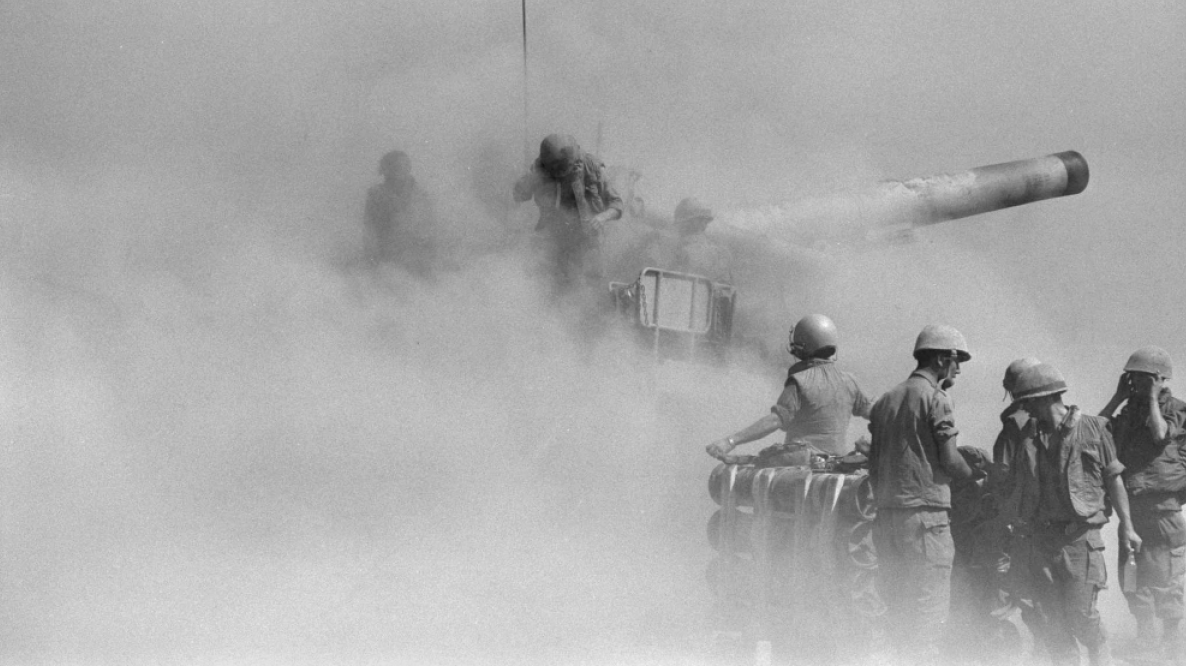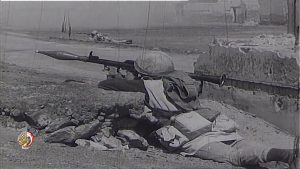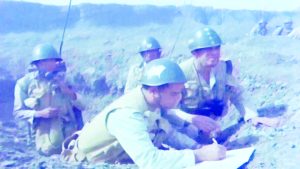
Sarah Saad
The fires of the October 1973 War had not stopped and the smell of gunpowder had not evaporated from the sands of Sinai yet, when most research and study centres started studying the results of this modern war.
After all the years that had passed since our victory in the October 1973 War, all strategic study centres and colleges and military institutes still confirm that this war had laid a cornerstone in the development of armament; organisation; tactics, and combat methods.
The Western military combat doctrine was a prime beneficiary of the lessons of that war.

The Israeli side adopted the Western doctrine, while the Egyptian Armed Forces adopted a new approach to combat concepts: a mixture of the Eastern ideology, following the Soviet military and the Egyptian combat experience in this modern war.
The impact of the October 1973 War on the Western military doctrine was manifested in the following areas:
First, although combat operations between the Egyptian army and the Israeli occupation army were classified as a ‘conventional war’, both militaries were equipped with the latest weapons and equipment, in addition to new systems that had not been used before in real combat fields. Electronic warfare (EW) and counter-electronic warfare (CEW) weapons were used, for the first time, in this war by both sides at the highest level of scientific technologies.
Second, the Egyptian army applied the principles of the Eastern doctrine in fighting, being armed with equipment, most of which was Soviet, while the Israeli occupation army applied the principles of the Western doctrine, having been equipped with Western weapons.
It was clear to all analysts that this was a battle between the ideology and armament of the Eastern doctrine, on one hand, the ideology and armament of the Western doctrine, on the other hand.
Third, battlefields around the world had not witnessed a conventional war since World War II in 1945. After this, combat concepts changed, weapons and equipment altered, and new technologies began to introduce new weapons and equipment.
Even the wars that took place after World War II, whether in Korea, Vietnam or elsewhere, were all fought by one powerful party, using its equipment and weapons, without organised resistance from the other side. No new thinking had emerged in combat methods or in the use of combat equipment.
Fourth, the Israeli army entered this war, relying on its victories in the 1967 operations, whether on the Egyptian, Jordanian or Syrian fronts. Perhaps the Israeli airstrike against Egypt in 1967 was, from a military point of view, the biggest evidence of this.

However, what the Egyptian army showed during the 1973 War, in terms of distinguished military performance, forced all research centres, strategic studies institutes, and military analysts to study and analyse how this army succeeded in defeating the Israeli occupation army and cutting off the long arm (the Israeli air force), which Israel had long bragged about after the 1967 war.
Fifth, the Egyptian Armed Forces achieved the element of surpriseat the strategic and tactical levels. As for performance, it prompted Chaim Herzog, the former president of Israel and the former director of its intelligence, to write in his memoirs about the October War, which were published in a book, that the Israeli army must, in the future, be able to act like the Banta Ficus plant which bends in the face of the first planned and organised strikes of the Egyptian Armed Forces, and then rises to strike it. The first planned strikes of the Egyptian army are always strong, fast and effective, he said.
Sixth, the Egyptian Armed Forces scored many achievements during the War of Attrition. We may recall the sinking of the Israeli destroyer, Eilat, an operation that led to a change in the armament pattern and combat style of naval forces around the world.
The construction of the Egyptian missile wall, west of the canal, during the War of Attrition, played a wonderful role during the war in neutralising the Israeli airforce and preventing it from interfering in the operations of the Egyptian forces crossing the canal.
Seventh, the tactics and new combat methods implemented by the Egyptian forces in this warprompted military analysts to study them and benefit from them.
Perhaps what prompts me and the Egyptian military to be proud is that all military institutes around the world, especially those with a Western doctrine, considered the lessons learned from the October 1973 War an integral part of their curricula in the courses of company commanders, battalions, brigades, the War College, and the National Defense College. The superiority of the Egyptian Armed Forces was the reason for changing many combat concepts in the Western combat doctrine.

The October War came, and a new factor emerged that was not accounted for before it: Egyptian soldiers. Ariel Sharon talked about Egyptian soldiers in a debate about the October War on British TV. When asked about his perspective about what constituted the surprise in the October War: the timing of the attack at 2:00pm, the attack being staged on Yom Kippur, or the attack being launched simultaneously on the Egyptian and Syrian fronts, Gen. Sharon answered by saying that Egyptian soldiers were the real surprise of the October War. These soldiers, he said, were different from the soldiers who fought in the 1956 and 1967 wars.
Egyptian soldiers were highly qualified in 1973 (holding bachelor’s degrees), with great morale, something considered by Sharon stronger than all calculations and timings. He cited an example during the attack on Deversoir, south-east of Ismailia where commanded a tank squadron, consisting of ten Israeli tanks towards Ismailia.
Suddenly, he said, five Egyptian commandos (from the Thunderbolt Forces) appeared before him.
It is normal that five soldiers facing ten tanks would mean certain death for the soldiers, yet the
five commandos succeeded in destroying five Israeli tanks.
Of course, these five Egyptian heroes were martyred, and Sharon was injured in this battle and was subsequently transferred to Israel.
Sharon added: “The soldiers I met in 1973 were not the Egyptian soldiers I fought in my wars in 1956 and 1967. Therefore, the surprise of this war is… the Egyptian soldiers, nothing else”.
He added: “Israel must take into account in any future war… the quality of these new Egyptian soldiers”.
From here, strategic studies institutes began to add a new factor when assessing and comparing powers, namely the combat quality calculation which refers to individual fighters.
This was thanks to the achievements made by Egyptian fighters in the 1973 War. This factor was not accounted for in previous calculations and estimates, leading to erroneous conclusions.
As for the latest impact, it was the change in the concept of ‘Mobile Defence’. The defensive method Israel applied to defend the Suez Canal line was the primary method in the Western doctrine, relying on strong points on the front line of defence, strong reserves in the depth to face attacking forces in containment areas, and destruction zones.
The attack of the Egyptian forceson the entire front and their penetration of Israeli defences found the Israeli armoured reserves stranded in the depth, unable to launch any strikes. The Israeli reserves dispersed in the face of the full confrontation, losing their battle.
After the war, NATO leaders began to implement the principle of ‘Active Defence’, the new form of defensive systems, in the American and British laws of war. France, on the other hand, resorted to developing a new form of mobile defence called the ‘Spider Mobile Defence’, which is impressive and respectful to the Egyptian Armed Forces. All these new ideas in developing the laws of war in the Western doctrine came as a result of the combat experience of the Egyptian forces in the 1973 War.
All this can show us that what Egyptian fighters achieved in the October 1973 War and this great victory was a result of their experiences and the new concepts introduced in military thought.
Military thinkers in various military doctrines will benefit from developing their theories after this war, which has contributed significantly to the advancement of military thought.

Leave a Reply